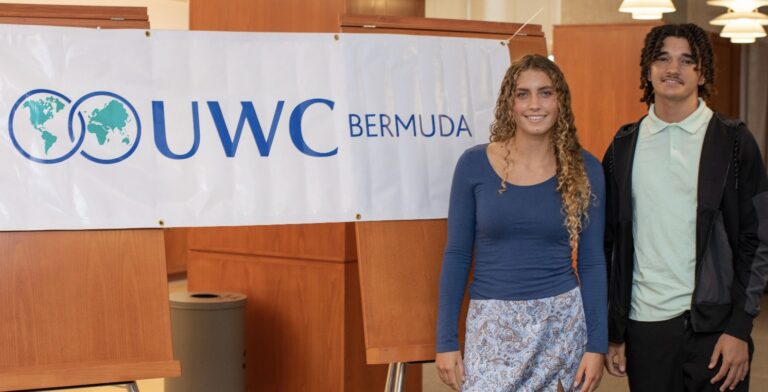If you haven’t heard of United World Colleges (UWC), this two-year programme for students aged 16 to 18 may be just the opportunity your son or daughter needs to make a difference in the world. With study opportunities available in 18 countries worldwide, students are challenged to think critically and lead with empathy while earning their International Baccalaureate (IB) Diploma. It’s a unique chance for Bermudian students to live and study overseas as they finish their final years of high school.
Sean Smatt is chair of the UWC Bermuda National Committee. He graduated from UWC USA in 1997. “Attending this programme was among the best things I ever did,” said Mr Smatt, who spent more than 20 years in the finance industry in Bermuda and Paris before deciding to become an independent strategic financial consultant. “The programme provides a unique environment for students aged 16 to 18 to live and study in an accepting, diverse international environment with people interested in the world around them. It’s a life-changing experience for those who attend.”
Since Bermuda joined the programme in 1963, more than 110 Bermudians have graduated from UWC. Among their many prestigious graduates, Mr Smatt is proud to highlight that Queen Noor of Jordan is currently UWC’s honorary president. She served as co-president with South African president Nelson Mandela until his death.
Each year, UWC holds an information session in November and applications are due in January and February for entry the following September. At these sessions, applicants learn that the Bermuda National Committee looks to choose candidates who embody UWC’s core principles. “We’re looking for people with a real curiosity about the world and a desire to have a unique experience,” said Zayna Foggo (Mahindra UWC India), head of selections and vice chair, noting that students from over 150 countries participate. “Applicants should have an active commitment to their own values, enjoy interacting with others with different view points, and be resilient, independent and responsible. Since the programme places students in a deliberately diverse environment, and it’s an academically rigorous programme, these attributes are key. The programme is very internationally oriented and service based,” Foggo added. “It’s meant for people with an intellectual curiosity about the world around them.”
Graduates of the programme go on to do all sorts of things from public service to marine biology to reinsurance. “The sky’s the limit. There really is diversity in what people pursue,” she said. But, they all have one thing in common. “Those who attend and graduate from UWC tend to have an interest in making a real impact on the world.”
Interested students will need to fill out a written application, which consists of a few short essay questions and background information. Then there’s an interview process for those selected. The committee wants applicants to be authentic. “Consider whether it’s an opportunity you’re genuinely excited about,” said Smatt. “If you are, apply. We’re interested in getting to know the student, and want people to be themselves, not the people they think we’re looking for.”
Once interviews are complete, the committee will discuss the candidates and make formal nominations. The committee uses a merit-based application process with financial assistance given based on need. He stresses that there is a “need-blind” selection process, which means that financial need is not considered until after the application process is completed. “Then we do our best to find and utilise our resources to send as many students as possible. The individual and collective financial need varies from year to year.
He explains that after students are selected, an independent member of the National Committee has financial discussions with families. “We give financial awards based on three things: the financial resources the national committee has available, how much UWC is willing to provide, and any contribution the family can make.” Mr Smatt said people should apply if they believe it’s a good fit for them, not because of their ability to pay. “Nobody should not apply because they believe their financial need is too great.”
Two-year programmes could cost from $65,000 to $110,000, depending on location and local currencies. Each year, one to five students are placed, and this is determined based on the number of applicants, space availability and the National Committee’s financial resources. The Bermuda Foundation, QBE Foundation and Butterfield & Vallis, in addition to multiple alumni and other friends of UWC, all contribute to making funding a reality for students. Other organisations are also welcome to participate in providing this support.
Though the deadline for this year passed on January 14, Foggo said it’s a good time to start thinking about the future. “People should reach out early for information. I’d recommend starting a year in advance,” she said. “Read about the programme, consider whether it’s something that’s really of interest and inform yourself about where the schools are. Reach out to committee members or even alumni.”
Interested families should feel free to email the Bermuda National Committee at [email protected]. To learn more about UWC and how to apply, visit bm.uwc.org or follow along on Instagram and Facebook at @uwcbermuda.

